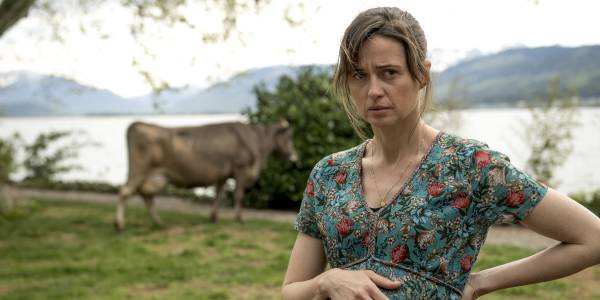There are increasingly more movies around the exponential gap between rich and poor. Perhaps this started with last year’s resounding success story Parasite – from which My Wonderful Wanda borrows – or even the hit TV show Succession about the effects of late-stage Capitalism, and how one family implodes from in-fighting over wealth and power. Or maybe it’s just a sign of the times. For whatever reason, it’s finally en vogue to discuss these issues at length. Bertina Oberli‘s My Wonderful Wanda doesn’t really add much to the conversation, or do much different than its predecessors in the genre, but it’s a good addition with plenty of humour and insight.
The Family Wegmaister-Gloor
Wanda (played by Agnieszka Grochowska) is a Polish carer, hired to look after the ailing patriarch of the Wegmaister-Gloor family, Josef (Andre Jung). Josef suffered a stroke and as a result is bed-bound, requiring assistance for the most basic of tasks. Wanda arrives from Poland a few times a year, works for a few months, and then goes back to Poland where her two young sons await her. She desperately needs the money so she can raise them. She is so desperate for the money, in fact, that she accepts Josef’s offer of extra money in exchange for sexual favours, unbeknownst to Josef’s wife Elsa (Marthe Keller). While this arrangement works for a while – even as Josef’s uptight businesswoman daughter Sophie (Birgit Minichmayr, bearing more than a passing resemblance in appearance and mannerisms to Siobhan from Succession) and hopelessly in love son Gregi (Jacob Matschenz) make life difficult for her – eventually Wanda finds herself with child and must confront the Wegmaister-Gloor family. This leads to a culture clash as Wanda’s Polish family arrives and immediately finds themselves at odds with the rich and out of touch Wegmaister-Gloors.

All of this makes for the typical kind of situational dramedy that serves this genre well. Sophie and her witless husband can’t get pregnant, and so an offer is made for Wanda’s unborn child which raises all kinds of ethical questions. Elsewhere, Elsa is reeling from the news of her husband’s infidelity (which he reveals to her in one of the funniest scenes of the movie) and of the potential complications a new child will have on the family’s finances: after all, now there are three heirs. Her solution is to pay Wanda to disappear and never return, putting her at odds with her daughter Sophie. Finally, heir to the Wegmaister-Gloor empire Gregi is madly in love with Wanda and wants to marry her and raise the child as his own. The narrative is a tangled weave of different motivations and absurd solutions which Oberli handles deftly. There are some hilarious moments in My Wonderful Wanda.
A Blank Sheet
The problem comes predominantly from the characters. Wanda herself is a blank sheet. There is little personality or motivation to her other than to provide for her sons. Her dealings with the Wegmaister-Gloors mostly exhaust her, as she has to navigate the complicated family dynamics in order to survive, but the character is so slight that it’s hard to care what happens to her. More interesting, but only slightly, is Josef, who Jung plays as a curmudgeonly old man tired of his family and completely unbothered about the consequences of his actions. It would have been interesting to mine a little more into his life or his relationship with his wife but alas those aspects also seem quite slight.
Of more interest is Sophie and her husband. Minichmayr is pitch-perfect as the suspicious, pinch-faced daughter who glares at Wanda with disdain in every scene. There is, of course, more to Sophie than meets the eye and it’s interesting to watch her character unfold over the course of the movie. As for everyone else, you might find their parts underplayed or just underutilised. Gregi is a bit one-note as the gloomy son living in his father’s shadow, and Elsa is the put-upon wife wondering why she threw her lot in with the selfish Josef in the first place. It’s all a little too surface level to mean much.
The basic premise carries My Wonderful Wanda through to its conclusion. The story here is about class difference and the insidiousness of it. In one scene, Sophie finds the sex money given to Wanda and assumes she stole it. This leads to an awkward moment where Wanda and Josef have to explain the money somehow. They alight on a ridiculous story involving Wanda’s need for a cow to make money for her family. Bizarrely, this isn’t even questioned by the family. In fact, Gregi – in what he perceives to be an act of heroic virtue – buys a cow and has it sent to Wanda’s dumbstruck and incredulous father, who promptly refuses it because why would he need a cow?
Conclusion
My Wonderful Wanda is a fun if slight, movie about the class divide and what happens when the lines are crossed. Unfortunately, it is thin on the ground with its characters, but it has moments of genuine humour and insight which make it worth the watch.
My Wonderful Wanda is the latest in a line of movies about the class divide. Which is your favourite? Let us know in the comments!
My Wonderful Wanda screened at the Glasgow Film Festival on February 26th
Watch My Wonderful Wanda
Does content like this matter to you?
Become a Member and support film journalism. Unlock access to all of Film Inquiry`s great articles. Join a community of like-minded readers who are passionate about cinema - get access to our private members Network, give back to independent filmmakers, and more.